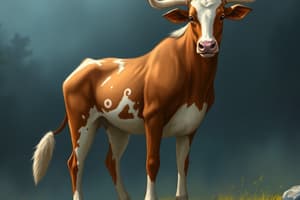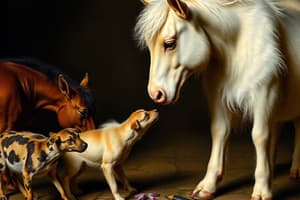Podcast
Questions and Answers
What is genetics?
What is genetics?
The study of heredity and variation in organisms.
Who is known as the father of genetics?
Who is known as the father of genetics?
- Hugo de Vries
- William Bateson
- Charles Darwin
- Gregor Mendel (correct)
The term 'genetics' was first coined in 1906.
The term 'genetics' was first coined in 1906.
True (A)
What does a gene encode?
What does a gene encode?
_____ proposed the science of heredity based on Mendel's law be named as genetics.
_____ proposed the science of heredity based on Mendel's law be named as genetics.
What does heredity refer to?
What does heredity refer to?
What was rediscovered independently by several scientists in relation to Mendel's work?
What was rediscovered independently by several scientists in relation to Mendel's work?
What does the term 'genetics' refer to?
What does the term 'genetics' refer to?
Who is known as the father of genetics?
Who is known as the father of genetics?
The word 'genetics' was coined in 1906.
The word 'genetics' was coined in 1906.
What is a gene?
What is a gene?
The process of ________ refers to the passing on of traits from parents to their offspring.
The process of ________ refers to the passing on of traits from parents to their offspring.
Match the following scientists with their contributions to genetics:
Match the following scientists with their contributions to genetics:
Which of these is a focus of genetic studies?
Which of these is a focus of genetic studies?
Flashcards are hidden until you start studying
Study Notes
Introduction to Genetics
- Every organism inherits traits from its parents, including plants, animals, microbes, and humans.
- Genetics provides insights into what makes organisms unique, exploring inheritance, variation, and gene regulation.
Domestication & Selective Breeding
- Domestication involves selective breeding of animals, transforming species such as wolves into dogs and wild horses into domesticated breeds.
- Historical domestication examples include camels, oxen, and cattle.
Historical Background of Genetics
- The origins of genetics trace back to hybridization theories discussed in the mid-19th century.
- The term "genetics" was coined in 1906 by William Bateson at the 3rd International Conference on Plant Hybridization, emphasizing the study of heredity and variation.
Key Figures in Genetics
- Gregor Mendel laid the foundation for genetic theory through his work on plant hybridization published in 1866.
- Mendel's discoveries were later independently rediscovered by scientists such as Hugo de Vries, Carl Correns, and Erich von Tschermak.
- William Bateson further promoted Mendel's principles and the concept of genetics.
Concepts of Heredity
- Heredity, or biological inheritance, refers to the transmission of traits from parents to offspring.
- The gene, a DNA region encoding specific traits, serves as a basic unit of heredity and genetic variation.
Important Breakthroughs in Genetics
- Development of the Cell Theory by Schwann, Schleiden, and Virchow shaped biological understanding.
- The scientific community moved away from the notion of spontaneous generation after rigorous investigations.
Ancient Contributions
- Early ideas about heredity were posited by the Hippocratic School of Medicine and Aristotle, who theorized the presence of "humors" as hereditary carriers.
Introduction to Genetics
- Every organism inherits traits from its parents, including plants, animals, microbes, and humans.
- Genetics provides insights into what makes organisms unique, exploring inheritance, variation, and gene regulation.
Domestication & Selective Breeding
- Domestication involves selective breeding of animals, transforming species such as wolves into dogs and wild horses into domesticated breeds.
- Historical domestication examples include camels, oxen, and cattle.
Historical Background of Genetics
- The origins of genetics trace back to hybridization theories discussed in the mid-19th century.
- The term "genetics" was coined in 1906 by William Bateson at the 3rd International Conference on Plant Hybridization, emphasizing the study of heredity and variation.
Key Figures in Genetics
- Gregor Mendel laid the foundation for genetic theory through his work on plant hybridization published in 1866.
- Mendel's discoveries were later independently rediscovered by scientists such as Hugo de Vries, Carl Correns, and Erich von Tschermak.
- William Bateson further promoted Mendel's principles and the concept of genetics.
Concepts of Heredity
- Heredity, or biological inheritance, refers to the transmission of traits from parents to offspring.
- The gene, a DNA region encoding specific traits, serves as a basic unit of heredity and genetic variation.
Important Breakthroughs in Genetics
- Development of the Cell Theory by Schwann, Schleiden, and Virchow shaped biological understanding.
- The scientific community moved away from the notion of spontaneous generation after rigorous investigations.
Ancient Contributions
- Early ideas about heredity were posited by the Hippocratic School of Medicine and Aristotle, who theorized the presence of "humors" as hereditary carriers.
Studying That Suits You
Use AI to generate personalized quizzes and flashcards to suit your learning preferences.





